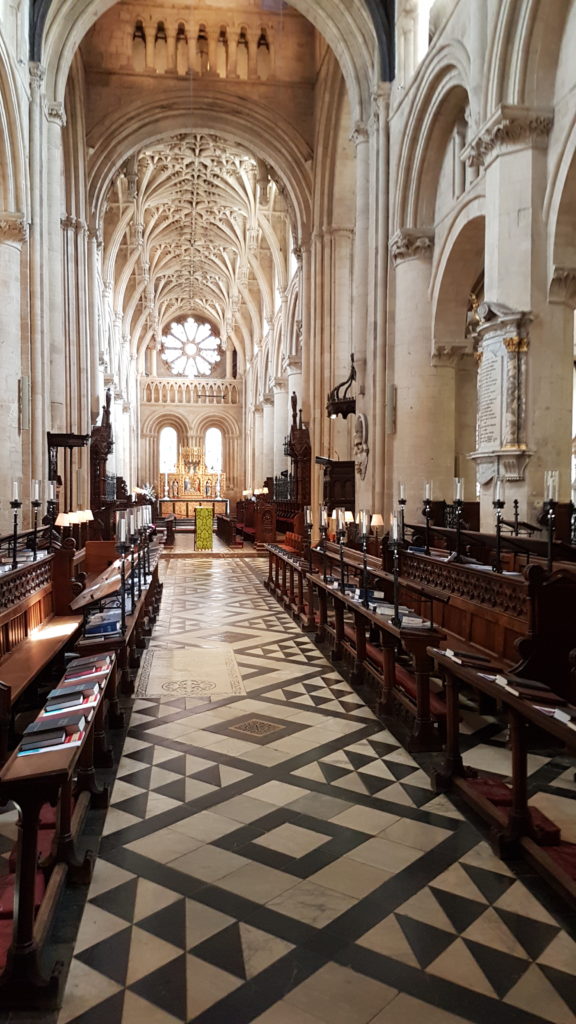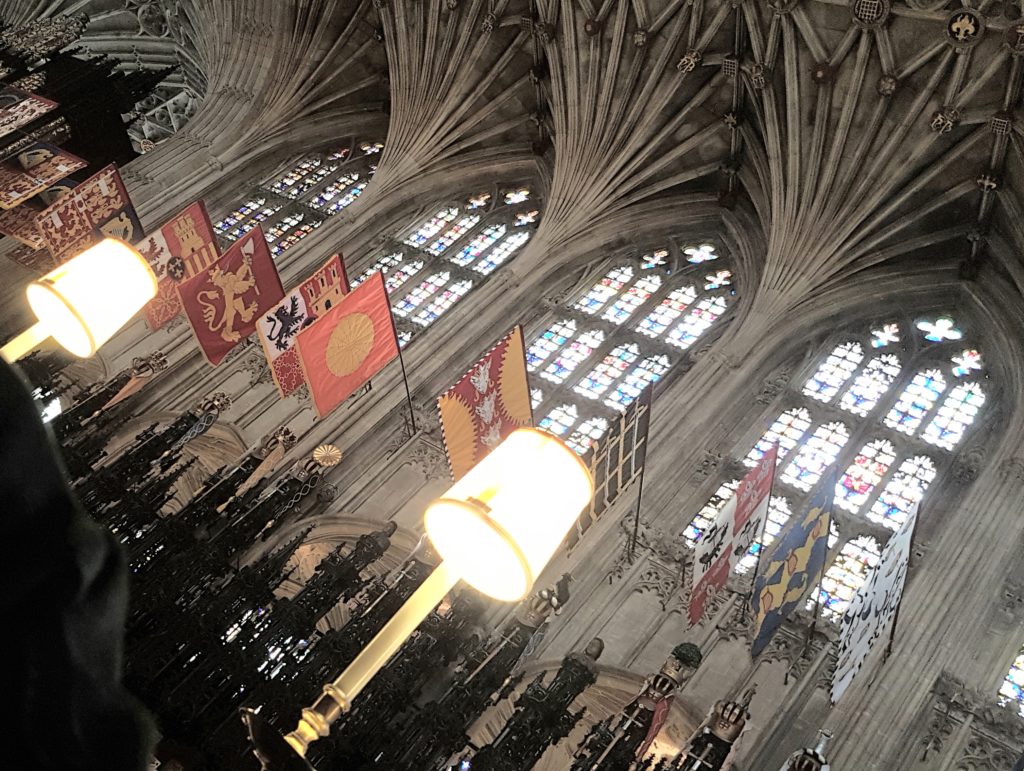
Chapel at Magdalen College, Oxford
Traditionally, Christian worship has been arranged around two things, the Word and the sacraments. These were the means by which human worshipers interacted with the transcendent God.
In the Roman Catholic worship service, the sacraments are emphasized–particularly the Eucharist. The primacy of the Eucharist is obvious; the altar from which Holy Communion is served is front and center.
After the Reformation, the new forms of Christian worship still emphasized Word and sacraments, but their importance was inverted. The sacraments, reduced to two, were moved to the side. The pulpit upon which sat a huge Bible takes center stage.
In churches with the more contemporary feel, a new means of encountering God has been given centre stage.
From Sacrament and Word to Band
More recently, North American Christianity has apparently undergone another reformation; this one much quieter than the first, but it is not insignificant. The modern church has cleared the stage of Word and Sacrament and replaced them with the worship band. Some might argue that the Word and the sacraments are still central, it’s just that the physical representations of these things needed to be moved to make room for musicians and instruments. In other words, it’s not a shift in meaning, but merely a physical shift made from practical considerations.
My core assumption here, and why I think all of this matters so much, is that the physical environment and liturgies of worship have profound effects on the worshipers, and how they think about the God who we worship. Even if the move was simply practical, and I don’t think it was, it will shape the hearts and minds of the congregants so that the central location of the band will mean that the music is central.
[click_to_tweet tweet=”The modern church has cleared the stage of Word and Sacrament and replaced them with the worship band. #Worship ” quote=”The modern church has cleared the stage of Word and Sacrament and replaced them with the worship band.”]
Active to Passive Worshipers
When the Word is the focus of worship we find a very active God. In the scriptures, God interacts with his creation and with his people. He speaks, breaths, commands, warns, condemns, promises and whispers. He causes some water to come from rocks and some he turns into blood. He makes walls fall and curtains tear. Jesus, the Word made flesh, heals, walks (even on water), teaches, eats, feed, dies, rises from the dead and ascends. The Holy Spirit is also active as we read scripture. He guides, comforts, indwells, guards, intercedes, baptizes, restrains and combats.
God is active in the sacraments as well. In baptism, he makes promises and in doing so he creates a people. In Communion, Jesus extends the elements to us and says “take and eat” and “take and drink.” When the Word and sacraments are central, and properly understood, we cannot help but understand our God to be active in worship, and in our lives.
[click_to_tweet tweet=”When the Word and sacraments are central, and properly understood, we encounter a God who is active in worship. If singing songs is central, does God just sit there and listen? #praiseandworship #worship #worshipleader” quote=”When the Word and sacraments are central, and properly understood, we encounter a God who is active in worship. If singing songs is central, does God just sit there and listen?”]
Liturgies Shape Us and the Way We Think
Human beings are shaped by worship, especially through the repeated things. With the weekly repetition of the Eucharist, Catholic worshipers come to the profound understanding of the unifying presence of Christ in his body the church and the Grace we receive by his death. With the Protestant emphasis on preaching, the weekly reading and exposition of scripture help the faithful to understand the centrality of the Word in their lives.
When the worship band takes center stage, something changes. Or at least there is a danger that something very important could change.
[click_to_tweet tweet=”Properly understood, the Word and the sacraments point to Christ and they present our interaction with an active God. When the worship band takes center stage, something changes. #praiseandworship #worshipleader #worship” quote=”Properly understood, the Word and the sacraments point to Christ and they present our interaction with an active God. When the worship band takes center stage, something changes.”]
Who is active in the singing part of the service? It seems to me the human beings are the primary actors, and this is a problem. Are we receiving a weekly reminder that God is passive? One might argue that, just as in the sacraments, both God and humanity take part. But this isn’t so obvious in practice. Singing is something we do–we are active, but we think of God as listening–possibly smiling during the choruses or seriously nodding if the song has a confessional element. When worship is primarily singing, God is relatively passive.
Who is most active in worship?
Things get worse when the band starts to slide out of the worship leading role into a performance role. This makes both God and congregants passive. In this scenario, musicians and singers are the only ones doing anything in worship.
Almost every worship leader that I know would recoil at this suggestion because they are forever on their guard for this shift, but just because they don’t intend it, doesn’t mean it doesn’t or it cannot happen in the minds of the congregants. It really is a no win situation; if the worship leaders are not a little animated then it seems like they are not engaged and worship lacks energy, but if they move around a little bit, they are accused of drawing attention to themselves. Perhaps this conundrum is a symptom of the deeper issue: That the worship band shouldn’t be front and centre in the first place.
The Problem of the Central Position
The problem is that from the central position, the Praise and Worship band is almost identical to secular performance bands. It’s a minuscule shift, then, for the congregation to move into the role of the audience. This shift isn’t unavoidable, but it requires some deliberate effort from the individual worshiper to experience the Sunday worship music in a different way than they would a concert. And churchgoers aren’t usually doing this work.
I am certainly not saying that singing praise and worship songs in church is a bad thing, we may have gained much with this shift in focus, but perhaps we’ve lost something too.
Questions to Consider
I’m not sure where to go from here, but I have some discussion questions that might help us address these issues.
- How can we do communion and baptism in ways that help us to see God’s activity in them? If we’re calling them ordinances instead of sacraments, should we rethink that?
- Can we find a place for the table, the font and the pulpit someplace on the stage?
- And can we preach from something other than a music stand?
- How can we do worship music in such a way that it’s as unlike a rock concert or dance club as we can make it? Can mix our volumes in such a way that the voices of the worshipers are heard? Can we reduce the lighting on the musicians? And can we turn down the bloody bass!?
This last point will be the subject on my next post: Concert versus Worship
In my series The Poetry of Worship, offer ways we can improve the lyrics of the praise and worship songs we sing. More importantly, I explain why we ought to.





